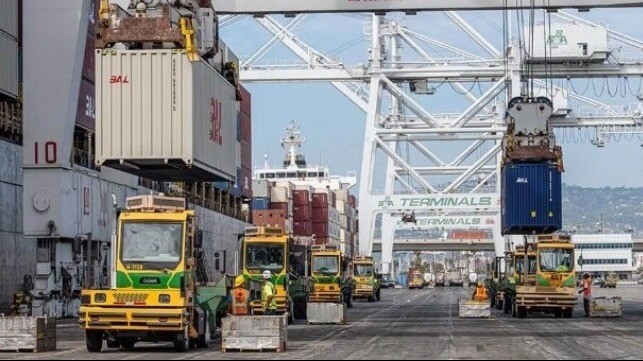FMC Surpasses $1M in Complaint Refunds from Carriers in Past 10 Months

The Federal Maritime Commission is reporting that it surpassed the $1 million milestone for charge complaints refunded or waived since the passage in June 2022 of the Ocean Shipping Reform Act. Fees charged by the carriers primarily in the form of detention and demurrage were one of the central complaints voiced by shippers and a driving factor contributing to the reform legislation.
Shippers complained that they were being charged unreasonable fees often when the situation was outside their control or that they were being given incomplete or inaccurate information such as when and where to return containers. The reform act sought to provide new mechanisms for shippers to file their complaints and puts the burden of justifying the charge on the carrier.
“The milestone of $1,045,953 in waived or refunded fees was reached on May 1st, slightly more than 10 months after OSRA became law,” the FMC said as part of its update on the process of implementing the changes to the law. “Charge Complaints provide a simplified and expedited process for shippers, consignees, truckers, and third parties to dispute charges which might have been wrongly assessed by a common carrier,” explains the FMC.
The FMC’s implementation of the Shipping Act reforms provided a simplified process for shippers to file these smaller, individual claims. They can email the FMC a description or statement on how the charge or fee violated the rules and provide supporting documentation such as invoices, bills of lading, proof of payment for the charges or fees demanded. Screen captures of denied booking appointments for the return of equipment, gate closures, or relevant emails also can be provided.
The charge complaint process is one of several options available to shippers seeking relief at the commission. Disputes can also be addressed through small claims or formal complaints processes, or by making use of dispute resolution services provided by the FMC. Companies wanting to allege misconduct can also share information with the commission that will be reviewed for potential investigatory action.
The total amount of fees waived or refunded through the charge complaint process does not include penalties or settlements realized through FMC’s enforcement activities. During yesterday’s regularly scheduled meeting of the commission, the Bureau of Enforcement reported that it has executed 191 investigations, 204 enforcement matters, 59 compliance matters, and three formal enforcement proceedings in FY 2022. They said the overwhelming majority of this activity has focused on ocean carriers and marine terminal operators. Additionally, more than $3 million in civil penalties have been collected as a result of FMC’s efforts since 2021.
Progress continues to be made on the implementation of the 2022 Ocean Shipping Reform Act with the report to the commission highlighting a new regional organization for investigators in the enforcement efforts. The country is being separated into three regions with ports in the North East and to Chicago in one region, the southern states in a second, and the west coast in a third region.

that matters most
Get the latest maritime news delivered to your inbox daily.
The staff also reported that progress continues to be made on two already commenced rulemakings. Commission staff is working to complete both the final rule on Demurrage and Detention Billing Requirements and the rulemaking related to Unreasonable Refusal to Deal or Negotiate with Respect to Vessel Space. Staff is also working on the rulemaking addressing Unfair or Unjustly Discriminatory Methods.
These efforts are moving forward as additional bills have also been introduced in the U.S. Congress calling for additional reforms to the shipping act. They are targeting vessel sharing agreements in the alliances as well as the data tools developed in China. Another proposed bill seeks to strengthen the FMC’s ability to take action when it believes there are antitrust violations.
